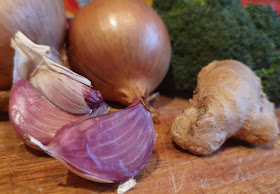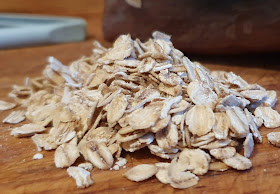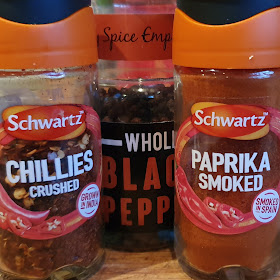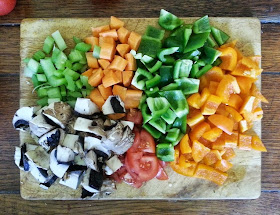Flu is nasty, it can make you really ill and it can take a long time to recover, as we found out when we all caught real flu last Winter. It was 4 months before we were all back to full health.
While no food is actually magic and even eating a perfect diet won't guarantee you'll stay healthy, having a boost never goes amiss.
Don't 'feed a cold, starve a fever'. You need some fuel in your body to fight, and heating up is a way your body fights intruders. Eat small amounts of easily digestible foods, such as runny soup or broth. Fever is actually helpful to a point, but any patient with fever of 93.4C (103F) needs to be referred to a doctor.
1. Water. It's not a food, but clear, clean water is necessary to prevent dehydration and you will not get better without it. If your patient is struggling to drink or keep anything down, try to sip 2oz an hour, every hour, until the situation improves. Ice cubes or ice lollies can be a great way to keep someone hydrated when they are hot and struggling to drink.
2. Garlic. People have known garlic has benefits since before your Gran's Grandmother was born. It gives a great immune system boost, although it will NOT prevent you becoming ill or cure any illness by itself, including the 2019 Coronavirus.
3. Mushrooms are an amazing anti-viral immune-system booster. They contain B vitamins as well as the antioxidant Selenium and Beta-Glucan (see Oats). They actively help your body fight flu. Try light mushroom soup if you are struggling to eat.
4. Vitamin C is vital for a healthy immune system and can be found in peppers, summer fruits, broccoli, beetroot, tomatoes, cauliflower and cabbage (especially red cabbage) and the one we all know, citrus fruits (oranges and lemons etc).
5. Vitamin E is also necessary for a healthy immune system. You'll find this in nuts and seeds, vegetable, corn and soyabean oils, wheat germ, green leafy veg such as broccoli and spinach, plus fortified breakfast cereals and spreads.
6. Oats contain Beta Glucan, which is a fantastic prebiotic, providing nutrients for healthy bacteria in your gut. It also boosts your immune system, so it's excellent for anyone who is ill with just about anything. You can also find prebiotics in fermented dairy products such as yogurt, cheese and sour cream.
7. Ginger (as every pregnant woman knows) relieves nausea and settles the stomach. It's also an anti-inflammatory and useful for all kinds of digestive conditions, as well as helping the body to create enemy-fighting cells. Ginger is closely related to Turmeric and Cardamom.
8. Zinc is a fabulous immune system-booster. It controls immune responses and helps your body to attack infected cells. Red meat and shellfish have high levels of Zinc, vegetarian sources include chickpeas, lentils and beans, nuts and seeds.
9. Live yoghurt. Live yogurt helps the body's gut by providing beneficial flora, and can give an immune system boost as well as help soothe upset tummies.
10. Ribonucleic Acid is an essential protein building block which will help your body fight and rebuild. You can find it in cereals, pulses, spinach, leek, broccoli, mushrooms, cabbage and cauliflower, and growing plants such as bean sprouts.
11. Chilli Pepper is actually beneficial to your tummy, unlikely as that may sound, because it encourages our body to create less stomach acids. It is a natural painkiller and anti-inflammatory, anti-bacterial and can also stimulate the immune system to fight off viruses. Along with spices such as Paprika (dried red peppers) and Black Pepper, it's also great at helping to clear your sinuses. I worked with Schwartz in December and shared 10 Paprika Winter Warmers.
A healthy balanced diet should contain a good variety of foods, including a at least 1/3 fruits and vegetables. Try and eat a rainbow of colours to get a good mix of vitamins and minerals.
Incorporating beneficial foods into your usual diet is the easiest and best way to ensure you eat them regularly. Here are some ideas to try:
- Top garlic bread with sliced onion and/or mushroom
- Ditch the jar and make your own curries - there are easy instructions in my curry for beginners recipe.
- Sprinkle potatoes, sweet potato or cauliflower with paprika and black pepper before roasting.
- Add a portion of spinach and/or a large spoon of seeds to any mixed vegetable dish
- Consider swapping milk for live yogurt with your breakfast cereal. Drink a glass of fruit juice with it to absorb more of the nutrients.
- Make your own tomato-based sauces and add plenty of beneficial ingredients. I have easy instructions for sausage and bean casserole and one-pot chilli.
- Gently toss thick cut onions, peppers, mushrooms, broccoli and other vegetables in a small amount of oil seasoned with garlic, ginger, paprika and pepper, then roast or stir fry for a different vegetable accompaniment.
- Have 2 vegetables with your dinner instead of 1, or 3 instead of 2.
- Add onion, tomato and/or mushrooms to your scrambled eggs or omelette, or go the whole way and add chopped up peppers, broccoli and other veg to make a frittata.
- Make your own burgers and add grated veg, chopped nuts and seeds to either minced meat or vegetable substitutes. I've a vegetarian burger recipe here (it uses a lot of nuts).
- Swap out half the flour for oats when you make cookies or biscuits. Oats are great for topping crumbles too.
I'm not a medical professional, but in a previous life I was an adult teacher for 2 Primary Care Trusts, and I worked (amongst other things) on the Food & Nutrition course. I'm always happy to be corrected - I'd rather it was right, so if you spot an error or know better then please speak up! Medical advice does change regularly, some foods that you might expect to see listed have negative effects on certain conditions or members of society, so I've opted to leave them out.






I am all for eating as much spinach as possible - super tasty when cooked with scrambled eggs! Totally agree that the foods you eat can have a huge effect on your immune system and then how your body fights off illness! A fab post x Sim
ReplyDeleteI have'nt tried your spinach eggs actually! I need to do that for my youngest. He adores eggs, but is super picky over veg :D
DeleteGood
ReplyDelete